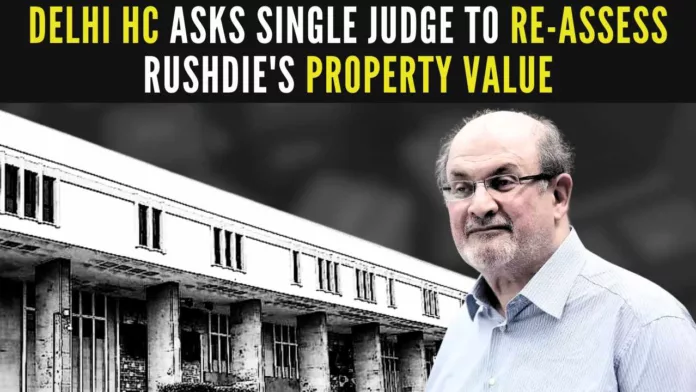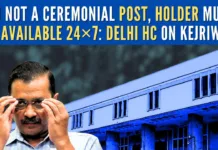
Delhi HC asks for re-evaluation of Salman Rushdie’s ancestral house property value
The Delhi High Court has asked a single judge to determine afresh the value of the ancestral house of Salman Rushdie at Civil Lines here which the globally renowned writer’s father had agreed to sell to a Congress leader Bhiku Ram Jain in 1970 but the deal stalled due to a dispute between the two sides. A division bench of Justices Vibhu Bakhru and Amit Mahajan set aside the single judge’s December 24, 2019 order pegging the value of the property at Rs.130 crore.
“We set aside the impugned order and remand the matter to the single judge to determine the value of the suit property afresh in terms of the directions issued by the Supreme Court. We direct the Registrar to place the matter before the concerned single judge on December 11, 2023, and request the single judge to conclude the proceedings as expeditiously as possible,” the bench said in its Tuesday judgment while allowing the appeals.
The dispute had gone all the way to the Supreme Court, which on December 3, 2012, ruled in favour of former Congress leader Bhiku Ram Jain and directed the Rushdies to hand over the house to the Jains for the market price as on the date of the order. The apex court, however, left it to the Delhi High Court to determine the market value of the property. The Jains approached the division bench challenging the single judge’s order determining the market value of the property, as of December 3, 2012, at Rs.130 crore, after the Rushdies said they had a prospective buyer who was ready to purchase the house at that price.
The single judge had said if the Rushdies were unable to sell it for a minimum of Rs.130 crore within 60 days from then, the Jains would be entitled to purchase the property for Rs.75 crore which was the circle rate prevailing on December 4, 2012. The judge had said if the Jains were unable to buy the property for Rs.75 crore, the Rushdies will stand relieved of the agreement entered into in 1970.
The Booker prize winner’s father Anis Ahmed Rushdie had entered into an agreement with Bhiku Ram Jain to sell the house for Rs.3.75 lakh.
In the appeal, the Jains contended that the single judge’s order exceeded the scope of remand which was limited to determining the market value of the property as of December 3, 2012. The division bench said the approach of putting in place two separate sale considerations for the property, one determined at Rs.130 crore with further recourse to perform the agreement at Rs.75 crore if the plaintiffs (Jains) did not pay the amount and the defendant (Rushdies) could not secure the same by further sale, is wholly alien to the scope of determination of the market value of the suit property as on December 3, 2012. Clearly, there cannot be two market values of the same property for specific performance of the agreement to sell, it said.
The bench said it was unable to concur with the single judge’s view that judicial notice could be taken that the price of the property as of December 3, 2012, would be higher than the price of immovable property as on the date of its determination (that is, on December 12, 2019).
Jain had paid Rs.50,000 to Anis Rushdie and assured him the rest of the amount will be paid after the owner got tax clearance certificates from income tax authorities. The two families then got into a dispute and accused each other of not respecting the terms of the agreement. The Jains filed a suit in 1977 requesting the trial court to direct Anis Rushdie to execute the December 1970 agreement.
On October 5, 1983, the trial court ruled in their favour, saying the Jains could get the property after paying the rest of the Rs.3.25 lakh promised to the Rushdies. The Rushdies then appealed in the Delhi High Court which on October 31, 2011 ruled that the Jains could not ask for the transfer of the bungalow to them and directed the Rushdies to return Rs.50,000 with 12 percent annual interest.
The Jains had then approached the apex court which, after hearing all sides, concluded that the high court erred in giving an order in favour of the Rushdies and quashed it. The high court held that a sale deed would have to be executed by the Rushdies in favour of the Jains for the market price of the suit property as of the date of the order — December 3, 2012.
For all the latest updates, download PGurus App.
- Supreme Court rejects plea to tally all VVPAT slips with EVM votes; says ‘no going back to paper ballot’ - April 26, 2024
- US report citing human rights violations is deeply biased: India - April 25, 2024
- Kotak Mahindra Bank shares tank 13%. Market Cap erodes by Rs.37,721 cr post-RBI action - April 25, 2024










